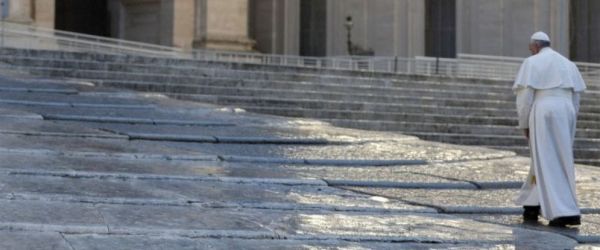Our God is the God of proximity, he is a God who is close, who walks with his people. That image in the desert, in Exodus: the cloud and the pillar of fire to protect the people: he walks with his people. He is not a God who leaves the prescriptions written down and says, 'Go ahead'. He makes the prescriptions, he writes them with his own hand on stone, he gives them to Moses, he gives them to Moses, but he does not leave the prescriptions and go: he walks, he is near. "What nation has a God so near?" It is closeness. Ours is a God of closeness.
And man's first response, in the first pages of the Bible, are two attitudes of non-neighbourliness. Our response is always to turn away, we turn away from God. He comes near and we turn away. Those two first pages. Adam's first attitude with his wife is to hide: they hide from God's closeness, they are ashamed, because they have sinned, and sin leads us to hide, to not want closeness (cf. Gen 3:8-10). And many times, [it leads] to a theology designed only on a judge God; and for this I hide, I am afraid. The second attitude, human, before the proposal of this closeness of God is to kill. To kill one's brother. "I am not my brother's keeper" (cf. Gen 4:9).
Two attitudes that wipe out all closeness. Man refuses God's closeness, he wants to be master of relationships, and closeness always brings with it some weakness. The 'near God' becomes weak, and the closer he gets, the weaker he seems. When he comes to us, to dwell with us, he makes himself man, one of us: he makes himself weak and brings weakness to the point of death and the cruellest death, the death of murderers, the death of the greatest sinners. Proximity humbles God. He humbles himself to be with us, to walk with us, to help us.
The 'near God' speaks to us of humility. He is not a 'great God', no. He is near. He is at home. And we see this in Jesus, God made man, close even unto death. With his disciples: he accompanies them, he teaches them, he corrects them with love... Let us think, for example, of Jesus' closeness to the distressed disciples of Emmaus: they were distressed, they were defeated, and he slowly approached them, to make them understand the message of life, of resurrection (cf. Lk 24:13-32).
Our God is near and asks us to be close, to each other, not to turn away from each other. And in this moment of crisis due to the pandemic we are experiencing, this closeness asks us to manifest it more, to show it more. We cannot, perhaps, get physically close because of the fear of contagion, but we can awaken in us an attitude of closeness among ourselves: with prayer, with help, so many ways of closeness. And why must we be close to one another? Because our God is close, he wanted to accompany us in life. He is the God of proximity. That is why we are not isolated people: we are close, because the inheritance we have received from the Lord is proximity, that is, the gesture of closeness.
Let us ask the Lord for the grace to be close, one to another; not to hide from one another; not to wash our hands, as Cain did, of another's problem, no. Neighbours. Proximity. Proximity. "For what great nation has the gods so close to it, as the Lord, our God, is close to us whenever we call upon Him?"
[Pope Francis, St Marta homily 18 March 2020]












